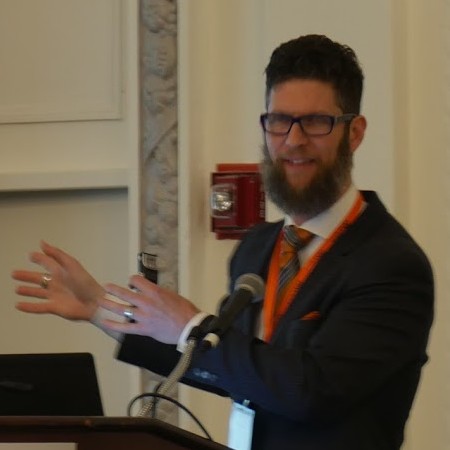If you step away from your legal tasks to learn tech, you'll stop wasting time at work
Patrick Palace, a lawyer based in University Park, Washington.
In order to eliminate waste and become more efficient, lawyers have to do something that, for many, might seem like the epitome of time-wasting. Likewise, if lawyers wish to upgrade their technological capabilities and improve the way the practice law, they have to do something that, for many, is antithetical to their being: Stop practicing law.
That’s what Florida-based law firm business coach Nora Riva Bergman and Washington state lawyer Patrick Palace told those in attendance at their Friday morning panel session at ABA Techshow entitled: “Resetting Your Law Firm for a Changing Economy and Marketplace.”
Bergman, a graduate of Villanova University’s Lean Six Sigma Program, gave attendees a crash course in Lean Six Sigma concepts and how they can apply to law firms, while Palace provided examples of software and tools that can help lawyers be more efficient and productive.
But first, they advised that lawyers do something that they are often wont to do. “You have to take the time to actually implement your strategies,” Bergman said. “And when you’re a lawyer, finding time can be incredibly difficult.”
Palace agreed. “If you want to retool your firm and head toward the future where you can be competitive and efficient, then you have to do this one thing first: Stop practicing law.”
Instead, Bergman suggested that lawyers carve out some time now so that they can save time later on. Bergman pointed out that lots of time gets wasted every day on things that could be fixed with technology. For instance, lawyers lose precious time by making unnecessary copies, having too many files at their desks, overdoing legal research or dealing with antiquated technology, among other things. She said that lawyers should also be sure that they meet their clients’ expectations and not waste time by performing tasks that are unnecessary or superfluous to their matters.
“Giving someone a filet mignon when they just wanted a burger is wasteful,” Bergman said. “You’re doing more than what a client wanted. Instead, you should be listening to what your client wants and find out what they actually value.”
Palace then provided some tips on what kinds of software and tools lawyers could use to solve those problems. He recommended Trello, a workflow tool that takes the place of the traditional sticky-notes-on-a-whiteboard system. For intraoffice communications, Palace noted that Slack is more efficient then email and is good for group chats, as well as more private communications. When it came to practice management software, he sympathized with those in the audience who might be overwhelmed by the Techshow Expo Hall where every company seemingly has an all-in-one solution. Instead, he advised attendees, especially those on a budget, to look at cost, simplicity and third-party integration capabilities, noting that Clio is the leader when it comes to integrations.
Indeed, for lawyers worried about cost, there were a lot of affordable programs to use when it came to document generation, shared drives, and cloud-based software. Google, for instance, has many options available—especially when it comes to document generation and sharing.
Palace also pointed out that lawyers shouldn’t just look to tech as a means of making their practices better. “Don’t be afraid to create new jobs,” said Palace, pointing out that he created a project manager job at his firm. “You may have tasks in your office and, to get them done, you might have to create a job. Just because it doesn’t exist in the office, doesn’t mean you can’t create it.”
Follow along with our full coverage of the 2017 ABA Techshow




